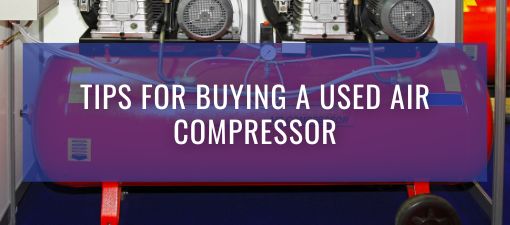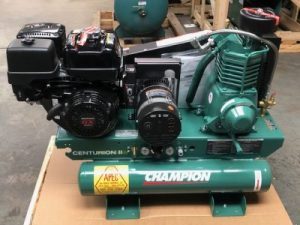
An air compressor can be quite an investment. Of course, smaller ones are more affordable, but you sacrifice a lot of power and endurance with a smaller compressor.
But new, large compressors can cost upwards of ten thousand dollars. While a compressor is undoubtedly a valuable tool, that price point can be a bit too high for some.
Good news! Used air compressors are much more affordable than brand new ones and, if you buy right, will work just as well and last just as long. An air compressor, if used correctly, should last for a long time, which makes buying a used one worth it.
But similar to buying a used car, there are some essential things to look out for.
Here at Air Power Equipment Company, we’ve identified some tips for buying a used air compressor and some things to look out for. As always, if you ever need help with an air compressor or are looking to purchase one, give our experts a call or visit our website!
Air Power Electric Company’s Tips for Buying an Air Compressor
Do an overall check.
Before you buy, examine the air compressor in its entirety. Check if it works and if it builds pressure normally. Ask the previous owner how often they used it. If the owner has any manuals or paperwork that provides insight on the compressors manufacturing details, ask for that as well.
Completing an overall check is crucial. Repairs on air compressors may cost more than the compressor itself.
Understand your needs.
Air compressors come in different sizes and capacities to satisfy different needs.
If you want an air compressor to pump up bike tires and basketballs, opt for a small, perhaps portable compressor. If you need to power air tools or use a paint spray gun in an auto body shop, get one that’s large and maybe even attachable to a wall.
How do you want to power your compressor?
Air compressors are powered mainly by either gas, diesel, or electricity. Gas or diesel air compressors tend to be more mobile than eclectic-powered ones. Electric-powered ones need to be close to an outlet or power source, though an extension cord helps.
Gas or diesel air compressors have more moving parts, which means more parts can break or become faulty. However, they are more powerful than their electric counterparts. Be mindful, though. Gas or diesel compressors need ample space for good ventilation.
Check for leaks.
Check gas or diesel compressors for oil or fuel leaks. A leak of any fluid, big or small, can be highly hazardous.
Determine if you need a fixed compressor or a portable compressor.
Fixed compressors are typically attached to a wall. Use this kind if you plan to use your compressor very frequently. Make sure it is fixed in a place where hot air ventilates.
If your application for an air compressor requires you to move around, opt for a portable one. These compressors are lightweight. There are larger compressors that are movable, too, but they are much heavier and harder to move.
Determine what noise level you are comfortable with.
Air compressors make noise. This is unavoidable. But, some compressors make less noise than others. For example, oil lubricated compressors usually make less noise than other compressors.
Oil lubricated compressors are more expensive, however. They are also heavier and require more maintenance than their oil-free air counterparts. But, oil lubricated compressors are longer-lasting.
Do you want to go big or go small?
Big-tank compressors are better for high-pressure needs because they hold more air and expel air with more pressure.
Small-tank compressors are great for assembly lines and can expel high-pressure air if paired with a strong motor, but the tank’s air will deplete much faster. As a result, you will have to wait for the compressor to refill before using it again.
Check the oil.
If the used compressor you’re looking to buy runs on oil, check which oil the previous owner used. Does it match the quality standards set by the manual, or had the owner skimped and bought cheaper oil?
You should never use an oil below the manual’s standards.
TIPS FOR BUYING A USED AIR COMPRESSOR
- Do an overall check
- Understand your needs
- Ask Yourself How do you want to power your compressor?
- Check for leaks
- Determine if you need a fixed compressor or portable compressor
- Determine what noise level you are comfortable with
- Do you want to go big or go small?
- Check the oil
FAQ
Should I buy a used air compressor?
Yes! Compared to new air compressors, they are affordable and can work just as well and just as long as new ones if adequately taken care of. Use our tips above to help in your search.
How much compressed air do I need?
Air tools made for portable compressors need 0 to 5 cubic feet per minute at 70 to 90 psi. However, air tools for fixed compressors need more than ten cubic feet per minute and up to 120 psi.
Which compressor is best for a garage?
Air compressors that range from two gallons to twenty gallons should give you what you need.
Air Power Equipment Company in Oklahoma City (OKC), is the leading source for new air compressor sales and used air compressor sales throughout the country. We specialize in rotary screw and reciprocal air compressor sales. Air Power Equipment Company is also the best source for air compressor service and parts in Oklahoma. If you are looking for new, used, parts, or air compressor service call Air Power Equipment Company OKC. We are experts with all brands of air compressor equipment and we are a stocking distributor of brands like FS Curtis Air Compressors, Champion Air Compressors, Campbell Hausfeld Air Compressors, Kellogg Air Compressors, American Air Compressors, Quincy Compressor and many more. Call us at (405) 445-1216 – we have what you need, and at the best price you will find.

